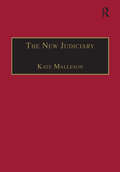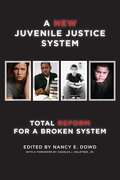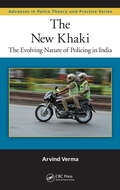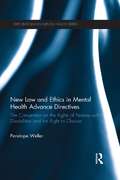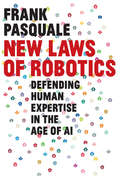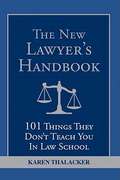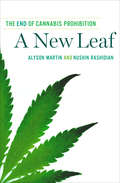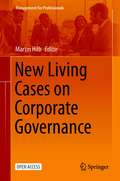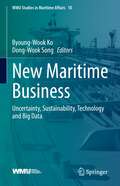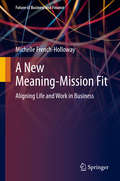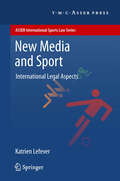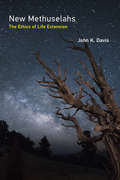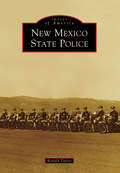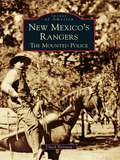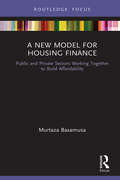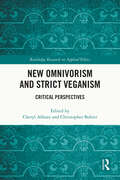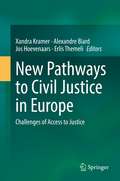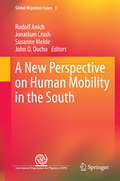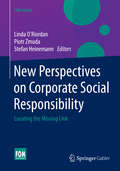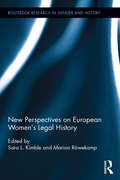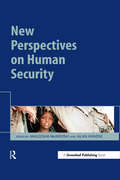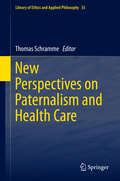- Table View
- List View
The New Judiciary: The Effects of Expansion and Activism
by Kate MallesonDuring the last thirty years, the judiciary has undergone an unprecedented expansion in its size and power. Judges now have more influence over our private and public lives than ever before. The effect of this change has been to transform the judiciary from an inward-looking elite into an increasingly heterogeneous professional body. 'The New Judiciary' examines the developments which have taken place in the appointment, training and scrutiny of judges as a result of the expanding judicial role. It highlights the increasing tension between the requirements of judicial independence and accountability which these changes are producing. The traditional insulation of the judiciary from all external influences is being challenged by the need for greater openness and public scrutiny of the judicial process. The passing of the Human Rights Act 1998, incorporating the European Convention on Human Rights into domestic law represents another stage in this process by expanding the policy-making role of the senior judiciary still further. As a result, the continuing modernisation of the judiciary, which is the subject of this book, will be a increasingly important feature of the legal and political process in the years ahead.
A New Juvenile Justice System: Total Reform for a Broken System (Families, Law, and Society #6)
by Charles J. Ogletree Jr. Nancy E. DowdA New Juvenile Justice System aims at nothing less than a complete reform of the existing system: not minor change or even significant overhaul, but the replacement of the existing system with a different vision. The authors in this volume--academics, activists, researchers, and those who serve in the existing system--all respond in this collection to the question of what the system should be. Uniformly, they agree that an ideal system should be centered around the principle of child well-being and the goal of helping kids to achieve productive lives as citizens and members of their communities. Rather than the existing system, with its punitive, destructive, undermining effect and uneven application by race and gender, these authors envision a system responsive to the needs of youth as well as to the community's legitimate need for public safety. How, they ask, can the ideals of equality, freedom, liberty, and self-determination transform the system? How can we improve the odds that children who have been labeled as "delinquent" can make successful transitions to adulthood? And how can we create a system that relies on proven, family-focused interventions and creates opportunities for positive youth development? Drawing upon interdisciplinary work as well as on-the-ground programs and experience, the authors sketch out the broad parameters of such a system. Providing the principles, goals, and concrete means to achieve them, this volume imagines using our resources wisely and well to invest in all children and their potential to contribute and thrive in our society.
The New Khaki: The Evolving Nature of Policing in India (Advances in Police Theory and Practice)
by Arvind VermaIn a democratic society, police are expected to be accountable to the people they serve, upholding the rights of citizens and following due process. In India, however, political pressure in the competitive electoral arena forces the police to adopt questionable means and dubious strategies. As a hierarchical bureaucratic organization, disciplined i
New Killing Fields: Massacre and the Politics of Intervention
by Nicolaus Mills Kira BrunnerThe question of the responsibility inherent in the unrivaled might of the U.S. military is one that continues to take up headlines across the globe. This award-winning group of reporters and scholars, including, among others, David Rieff, Peter Maass, Philip Gourevitch, William Shawcross, George Packer, Bill Berkeley and Samantha Power revisit four of the worst instances of state-sponsored killing--Cambodia, Yugoslavia, Rwanda, and East Timor--in the last half of the twentieth century in order to reconsider the success and failure of U.S. and U.N. military and humanitarian intervention.Featuring original essays and reporting, The New Killing Fields poses vital questions about the future of peacekeeping in the next century. In addition, theoretical essays by Michael Walzer and Michael Ignatieff frame the issue of intervention in terms of today's post-cold war reality and the future of human rights.
New Law and Ethics in Mental Health Advance Directives: The Convention on the Rights of Persons with Disabilities and the Right to Choose (Explorations in Mental Health)
by Penelope WellerThe recognition of positive rights and the growing impact of human rights principles has recently orchestrated a number of reforms in mental health law, bringing increasing entitlement to an array of health services. In this book, Penelope Weller considers the relationship between human rights and mental health law, and the changing attitudes which have led to the recognition of a right to demand treatment internationally. Weller discusses the ability of those with mental health problems to use advance directives to make a choice about what treatment they receive in the future, should they still be unable to decide for themselves. Focusing on new perspectives offered by the Conventions on the Rights of Persons with Disabilities (CRPD), Weller explores mental health law from a variety of international perspectives including: Canada, Australia, New Zealand and the United Kingdom, where policies differ depending on whether you are in England and Wales, or Scotland. These case studies indicate how human rights perspectives are shifting mental health law from a constricted focus upon treatment refusal, towards a recognition of positive rights. The book covers topics including: refusing treatment new approaches in human rights international perspectives in mental health law the right to demand treatment. The text will appeal to legal and mental health professionals as well as academics studying mental health law, and policy makers.
New Laws of Robotics: Defending Human Expertise In The Age Of Ai
by Frank PasqualeAI is poised to disrupt our work and our lives. We can harness these technologies rather than fall captive to them—but only through wise regulation.Too many CEOs tell a simple story about the future of work: if a machine can do what you do, your job will be automated. They envision everyone from doctors to soldiers rendered superfluous by ever-more-powerful AI. They offer stark alternatives: make robots or be replaced by them.Another story is possible. In virtually every walk of life, robotic systems can make labor more valuable, not less. Frank Pasquale tells the story of nurses, teachers, designers, and others who partner with technologists, rather than meekly serving as data sources for their computerized replacements. This cooperation reveals the kind of technological advance that could bring us all better health care, education, and more, while maintaining meaningful work. These partnerships also show how law and regulation can promote prosperity for all, rather than a zero-sum race of humans against machines.How far should AI be entrusted to assume tasks once performed by humans? What is gained and lost when it does? What is the optimal mix of robotic and human interaction? New Laws of Robotics makes the case that policymakers must not allow corporations or engineers to answer these questions alone. The kind of automation we get—and who it benefits—will depend on myriad small decisions about how to develop AI. Pasquale proposes ways to democratize that decision making, rather than centralize it in unaccountable firms. Sober yet optimistic, New Laws of Robotics offers an inspiring vision of technological progress, in which human capacities and expertise are the irreplaceable center of an inclusive economy.
The New Lawyer's Handbook
by Karen Thalacker101 Success Strategies They Didn't Teach You in Law School - get expert advice on becoming a better lawyer. Law school prepares you to think like a lawyer, write like a lawyer, and research like a lawyer-but once you're in the door of a law firm, there's a whole new set of skills you need. The New Lawyer's Handbook guides you through the 101 essential things you need to know in order to excel. From how to handle your clients and how to work with people in your office, to why it pays to learn to play golf and maintain some semblance of a family life even as you make your billables, The New Lawyer's Handbook gives you the knowledge you need to succeed.
A New Leaf: The End of Cannabis Prohibition
by Alyson Martin Nushin RashidianTwo award-winning journalists offer a &“cogent, well-sourced and ambitious analysis of the slow decline of cannabis prohibition in the United States&” (Kirkus Reviews). In November 2012, voters in Colorado and Washington passed landmark measures to legalize the production and sale of cannabis for social use—a first in the United States and the world. Once vilified as a &“gateway drug,&” cannabis is now legal for medical use in eighteen states and Washington, DC. Yet the federal government refuses to acknowledge these broader societal shifts. 49.5 percent of all drug-related arrests involve the sale, manufacture, or possession of cannabis. In the first book to explore the new landscape of cannabis in the United States, investigative journalists Alyson Martin and Nushin Rashidian demonstrate how recent cultural and legal developments tie into cannabis&’s complex history and thorny politics. Reporting from nearly every state with a medical cannabis law, Martin and Rashidian interview patients, growers, doctors, entrepreneurs, politicians, activists, and regulators. A New Leaf moves from the federal cannabis farm at the University of Mississippi to the headquarters of the ACLU to Oregon&’s World Famous Cannabis Café. The result is a lucid account of how cannabis legalization is changing the lives of millions of Americans and easing the burden of the &“war on drugs&” both domestically and internationally.
The New Legal Realism, Volume I: Translating Law-and-Society for Today's Legal Practice
by Elizabeth Mertz Stewart Macaulay Thomas W. MitchellThis is the first of two volumes announcing the emergence of the new legal realism as a field of study. At a time when the legal academy is turning to social science for new approaches, these volumes chart a new course for interdisciplinary research by synthesizing law on the ground, empirical research, and theory. Volume 1 lays the groundwork for this novel and comprehensive approach with an innovative mix of theoretical, historical, pedagogical, and empirical perspectives. Their empirical work covers such wide-ranging topics as the financial crisis, intellectual property battles, the legal disenfranchisement of African-American landowners, and gender and racial prejudice on law school faculties. The methodological blueprint offered here will be essential for anyone interested in the future of law-and-society. Demonstrates the importance of interdisciplinary translation between law and social sciences Introduces readers to the scholarship of today's leading new legal realists. Shows how new legal realism can provide a broader lens than the empirical legal studies movement.
The New Legal Realism, Volume II: Studying Law Globally
by Heinz Klug Sally Engle MerryThis is the second of two volumes announcing the emergence of the new legal realism. At a time when the legal academy is turning to social science for new approaches, these volumes chart a new course for interdisciplinary research by synthesizing law on the ground, empirical research, and theory. Volume 2 explores the integration of global perspectives and information into our understanding of law. Increasingly, local experiences of law are informed by broader interactions of national, international, and global law. Lawyers, judges, and other legal actors often have to respond to these broader contexts, while those pursuing justice in various global contexts must wrestle with the specific problems of translation that emerge when different concepts of law and local circumstances interact. Using empirical research, the authors in this path-breaking volume shed light on current developments in law at a global level. Demonstrates the importance of interdisciplinary translation between law and social sciences Introduces readers to the scholarship of today's leading new legal realists. Shows how new legal realism can provide a broader lens than the empirical legal studies movement.
New Living Cases on Corporate Governance (Management for Professionals)
by Martin HilbThis unique open access book features a selection of Living Cases on Corporate Governance, which were developed and compiled by chairpersons, members of the board of directors, and CEOs in various countries, working in close collaboration with prominent researchers. Each Living Case addresses a current issue that a given company or institution needs to resolve. For every Case, the goal is formulated by the researcher, in consultation with the client. The participants of internal or external board seminars, or university students, then work in teams to analyze the problem, develop an innovative and feasible solution, and summarize the most important lessons learned.
New Maritime Business: Uncertainty, Sustainability, Technology and Big Data (WMU Studies in Maritime Affairs #10)
by Byoung-Wook Ko Dong-Wook SongThis book provides a response to the unexpected challenges imposed on every aspect of today’s maritime business. All chapters of this book are concerned with the single challenge facing the maritime business world – that is, uncertainty. Each chapter deals with a specific area of the maritime business community in an effort to better understand the complicated markets, to seek for a solution of economic or financial sustainability under the pressure of climate changes, to discuss technology as an option for the future, and finally to show how to utilise the big data set for better informed decision- and policymaking that used to be unfeasible in terms of scale and capacity. It is hoped that all those endeavours are considered as the first small step towards practically transforming the industry in line with Schumpeter (1943) as well as academically changing a paradigm of thinking and scientific discovery in line with Kuhn (2012), so that the maritime industry is better informed and prepared, and can greatly contributing to human lives.
A New Meaning-Mission Fit: Aligning Life and Work in Business (Future of Business and Finance)
by Michelle French-HollowayThis book offers a clear process for managers, professionals, and future leaders to help discover their personal meaning in life and apply it to their work. The author uses research outcomes and theories to refute the contemporary philosophy that stresses following an individual’s passion alone when choosing a particular job or career. Instead, she recommends employing a personal meaning-oriented approach to life and work, and then becoming passionate about one’s work organically.The book also highlights the positive outcomes to organizations and societies when individuals engage with finding meaning in work, focusing on physical and emotional health and satisfaction. The author provides numerous examples of leaders who have aligned their personal meaning and organizational mission, also known as “meaning-mission fit,” and the relationship of this alignment to their emotional well-being. Together, the research, theory, and evidence in this book equip leaders and managers with an inspiring model to find their own meaning-mission fit, as well as create opportunities for the employees to do the same.
New Media and Sport
by Katrien LefeverDuring the past decade, the media landscape and the coverage of sports events have changed fundamentally. Sports fans can consume the sports content of their choice, on the platform they prefer and at the time they want. Furthermore, thanks to electronic devices and Internet, content can now be created and distributed by every sports fan. As a result, it is argued that media regulation which traditionally contains rules safeguarding access to information and diversity would become redundant. Moreover, it is sometimes proposed to leave the regulation of the broadcasting market solely to competition law.This book, illustrates that media law is still needed, even in an era of abundance, to guarantee public's access to live and full sports coverage. Dealing with the impact of new media on both media and competition law this book will greatly appeal to academics and stakeholders from various disciplines, such as legal and public policy, political science, media and communications studies, journalism and European studies. Additionally it contains valuable information and points of view for policy makers, lawyers and international and intergovernmental organisations, active in media development. The book contains an up-to-date analysis and overview of the different competition authorities' decisions and media provisions dealing with the sale, acquisition and exploitation of sports broadcasting rights. Katrien Lefever is Senior Legal Researcher at IBBT - The Interdisciplinary Centre for Law and ICT (ICRI), KU Leuven, Belgium. The book appears in the ASSER International Sports Law Series, under the editorship of Prof. Dr. Robert Siekmann, Dr. Janwillem Soek and Marco van der Harst LL.M.
New Methuselahs: The Ethics of Life Extension (Basic Bioethics)
by John K. DavisAn examination of the ethical issues raised by the possibility of human life extension, including its desirability, unequal access, and the threat of overpopulation. Life extension—slowing or halting human aging—is now being taken seriously by many scientists. Although no techniques to slow human aging yet exist, researchers have successfully slowed aging in yeast, mice, and fruit flies, and have determined that humans share aging-related genes with these species. In New Methuselahs, John Davis offers a philosophical discussion of the ethical issues raised by the possibility of human life extension. Why consider these issues now, before human life extension is a reality? Davis points out that, even today, we are making policy and funding decisions about human life extension research that have ethical implications. With New Methuselahs, he provides a comprehensive guide to these issues, offering policy recommendations and a qualified defense of life extension. After an overview of the ethics and science of life extension, Davis considers such issues as the desirability of extended life; whether refusing extended life is a form of suicide; the Malthusian threat of overpopulation; equal access to life extension; and life extension and the right against harm. In the end, Davis sides neither with those who argue that there are no moral objections to life enhancement nor with those who argue that the moral objections are so strong that we should never develop it. Davis argues that life extension is, on balance, a good thing and that we should fund life extension research aggressively, and he proposes a feasible and just policy for preventing an overpopulation crisis.
New Mexico State Police (Images of America)
by Ronald TaylorThe New Mexico State Police traces its beginnings to the New Mexico Mounted Police, a statewide law-enforcement agency that was disbanded in 1921. No state law enforcement existed until the formation of the New Mexico Motor Patrol in 1933. A year and a half later, the governor of the state of New Mexico and the chief of the patrol saw the need to expand their forces to better serve the citizens of New Mexico. The New Mexico State Police formed in 1935, marking the beginning of what has become many years of tradition and service.
New Mexico's Rangers: The Mounted Police (Images of America)
by Chuck HornungThe New Mexico Mounted Police were forged from a frontier civil crisis and hammered to life upon the anvil of necessity. The Sunshine Territory of New Mexico had become the last outlaw haven in the Southwest. In the tradition of their red-coated namesake, the Northwest Mounted Police of Canada, this small band of range riders used their fists, guns, and brains to restore law and order during the closing years of New Mexico's territorial era. They carried their mission forward into the early days of statehood.
A New Model for Housing Finance: Public and Private Sectors Working Together to Build Affordability
by Murtaza BaxamusaA New Model for Housing Finance presents a thought-provoking solution to the housing crisis that follows the division of public and private money on housing costs and benefits. It brings a practical perspective on why housing is unaffordable, and what can be done about it using public and private capital. This book re-examines the foundation of housing finance in the United States with the aim to shift the paradigm from the public and private sectors working in silos, to working together. Through brief yet rigorous chapters, the book assesses the policy failures of both public and private sectors by drawing attention to the continuing human impacts of this man-made crisis, finally calling for a new model of financing housing through public–private partnerships. The limited impact and false hope of planning interventions, as well as the widespread economic impacts of the global pandemic of 2020, demonstrate the urgent need for change in our approach to housing policy, and this book lays out a path forward. It will be of interest to anyone working in or studying housing, social justice, urban planning, urban studies, and public policy.
New Omnivorism and Strict Veganism: Critical Perspectives (Routledge Research in Applied Ethics)
by Cheryl Abbate Christopher BobierA growing number of animal ethicists defend new omnivorism—the view that it’s permissible, if not obligatory, to consume certain kinds of animal flesh and products. This book puts defenders of new omnivorism and advocates of strict veganism into conversation with one another to further debate in food ethics in novel and meaningful ways. The book includes six chapters that defend distinct versions of new omnivorism and six critical responses from scholars who are sympathetic to strict veganism. The contributors debate whether it’s ethically permissible to eat the following: "freegan" meat; roadkill; cultured meat; genetically disenhanced animals; possibly insentient animals, such as insects; and fish. The volume concludes with two chapters that examine strict vegan and new omnivore policies. Presenting readers with clear defenses and criticisms of the various dietary proposals, this book draws attention to the most important ethical challenges facing traditional animal agriculture and alternative systems of food production. New Omnivorism and Strict Veganism will appeal to scholars and students interested in food ethics, animal ethics, and agricultural ethics.
New Pathways to Civil Justice in Europe: Challenges of Access to Justice
by Xandra Kramer Alexandre Biard Jos Hoevenaars Erlis ThemeliThis book focuses on four topical and interconnected, innovative pathways to civil justice within the context of securing and improving access to justice: the use of Artificial Intelligence and its interactions with judicial systems; ADR and ODR tracks in privatising justice systems; the effects of increased self-representation on access to justice; and court specialization and the establishment of commercial courts to counter the trend of vanishing court trials. Top academics and experts from Europe, the US and Canada address these topics in a critical and multidisciplinary manner, combining legal, socio-legal and empirical insights. The book is part of ‘Building EU Civil Justice’, a five-year research project funded by the European Research Council. It will be of interest to scholars and policymakers, as well as practitioners working in the areas of civil justice, alternative dispute resolution, court systems, and legal tech. The chapters “Introduction: The Future of Access to Justice – Beyond Science Fiction” and “Constituting a Civil Legal System Called “Just”: Law, Money, Power, and Publicity” are available open access under a Creative Commons Attribution 4.0 International License via link.springer.com.
A New Perspective on Human Mobility in the South (Global Migration Issues #3)
by Rudolf Anich Jonathan Crush Susanne Melde John O. OuchoThis book offers innovative insights on South-South human mobility. It features a collection of papers that highlight often overlooked mobility patterns among and within regions in the global South as well as address critical realities faced by South-South migrants. This publication thoroughly investigates key issues of the migration debate, spanning from the terminological and contextual meaning of migration and development. It also critically examines some of the key features that human mobility in the global South is characterized by, including the prevalence of intra-regional and labor mobility, the role of diasporas communities in developing countries, South-South remittances patterns, the influence of environmental factors on the decision to migrate and the rising number of child migrants. By carefully moving the lens from the frequently examined South-North and North-North movements to human mobility within the Southern regions of the world, this book questions the traditional conception of the migration paradigm. It offers knowledge and insights that will help to expand the debate as well as stimulate further research on this important topic and, hopefully, promote future activities aimed at the protection of migrants and their families living in the South. As a result, it is an ideal resource for migration scholars, policy-makers and development practitioners.
New Perspectives on Corporate Social Responsibility
by Linda O'Riordan Piotr Zmuda Stefan HeinemannProviding a timely contribution to the ongoing questions surrounding topics which are by definition subject to varying stakeholder interpretations, this book addresses "the missing link" between theoretical CSR concepts and everyday management practice. It acts as a guide to awaken managers to the advantages of adopting a CSR "mindset" when developing sustainable business strategies. The book consists of three parts: 1) A theoretical realm which establishes the key concepts and rationale for the adoption of a sustainable CSR approach, 2) A practical realm which addresses putting CSR and sustainability into business practice, 3) An educational realm which proposes how to incorporate the concepts into teaching and training.
New Perspectives on European Women's Legal History (Routledge Research in Gender and History #24)
by Sara L. Kimble Marion RöwekampThis book integrates women’s history and legal studies within the broader context of modern European history in the late nineteenth and twentieth centuries. Sixteen contributions from fourteen countries explore the ways in which the law contributes to the social construction of gender. They analyze questions of family law and international law and highlight the politics of gender in the legal professions in a variety of historical, social and national settings, including Eastern, Southern, Western, Northern and Central Europe. Focusing on different legal cultures, they show us the similarities and differences in the ways the law has shaped the contours of women and men’s lives in powerful ways. They also show how women have used legal knowledge to struggle for their equal rights on the national and transnational level. The chapters address the interconnectedness of the history of feminism, legislative reforms, and women’s citizenship, and build a foundation for a comparative vision of women’s legal history in modern Europe.
New Perspectives on Human Security
by Malcolm McIntosh Alan HunterThis book is testimony to the emergent nature of human security as an idea, as a useful construct and as an operational strategy. The aim is to showcase new directions that may enrich the human security agenda. Some human security discourse is still rooted in the traditional language of the aid-agency/UN development/economic growth models, often hostile to the corporate and business sector, and sometimes negligent of sustainability and climate change issues. Another limited and outmoded approach is an exaggerated focus on Western interventions, especially military ones, as a "solution" to problems in poor or conflict-prone areas. "Human Security" was introduced as a construct by the UNDP in 1994. The inherent combination of law-enforcement and people-centred humanitarianism has strived to provide an umbrella to both protect people from threats while empowering them to control their destinies. But with accelerating economic globalization and information flows there is a need to revisit the concept. A new paradigm of Sustainable Human Security is required. This book argues that proponents of a human security approach should welcome efforts to remove the barriers between enterprise, corporations, aid and development agencies, government agencies, citizen groups and the UN; and work towards multi-stakeholder approaches and solutions for vulnerable populations. Such an approach is clearly vital in responding to the imperatives of concerted action on issues such as climate change, HIV, terrorism, organised crime and poverty. The agenda may have changed, but it remains true that almost all human tragedies are avoidable. This book examines a number of global problems through the lens of human security and the needs of the individual: global governance; health; the environment and the exploitation of natural resources; peace and reconciliation; the responsibility to protect; and economic development and prosperity. In the latter case, the role of business in the human security pantheon is promulgated. There are many reasons why businesses may want to engage with the needs of vulnerable populations – not least the fact that companies cannot function without secure trading environments. In addition, there are growing demands for corporate responsibility and citizenship from markets, customers, shareholders, employees and, critically, communities. This book throws new light on the human security agenda. It will be essential reading for anyone involved in the debates on human security as well as for practitioners and scholars in international affairs, global governance, peace studies, climate change and the environment, healthcare, responsibility to protect and corporate responsibility.
New Perspectives on Paternalism and Health Care
by Thomas SchrammeThis work sets the stage regarding debates about paternalism and health care for years to come. The anthology is organized around four parts: i) The concept of paternalism and theoretical issues regarding the idea of anti-paternalism, ii) strategies for justifying different forms of paternalism, iii) paternalism in psychiatry and psychotherapy, iv) paternalism and public health, and v) paternalism and reproductive medicine. Medical paternalism was arguably one of the main drivers of debates in medical ethics and has led to a wide acknowledgement of the value of patient autonomy. However, more recent developments in health care, such as the increasing significance of public health measures and the commercialization of medical services, have led to new social circumstances and hence to the need to rethink issues regarding paternalism. This work provides an invaluable source for many scholars and practitioners, since it deals in new and original ways with one of the main and oldest issue in health care ethics.
